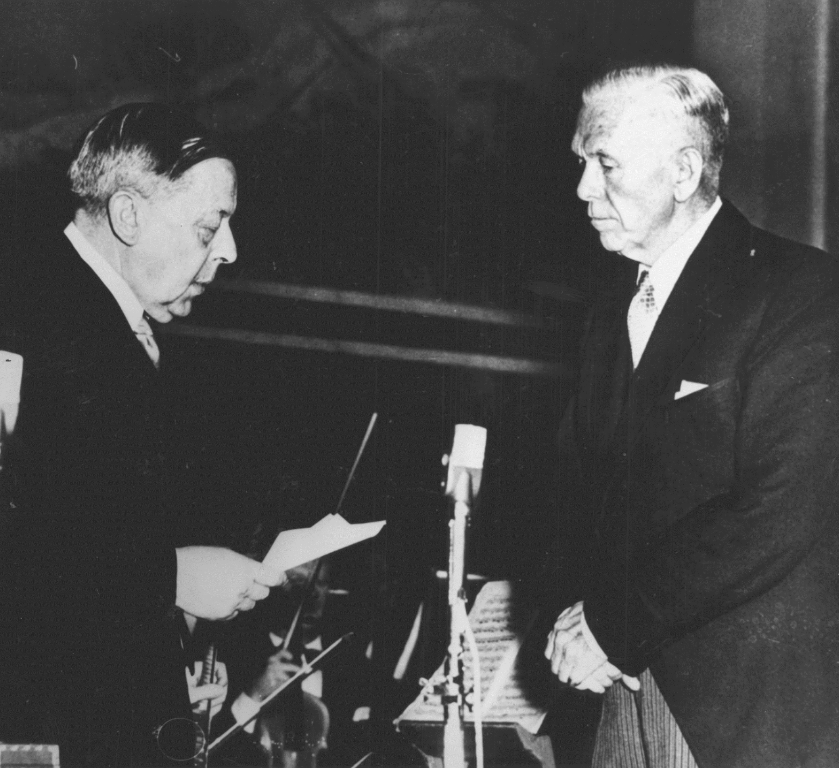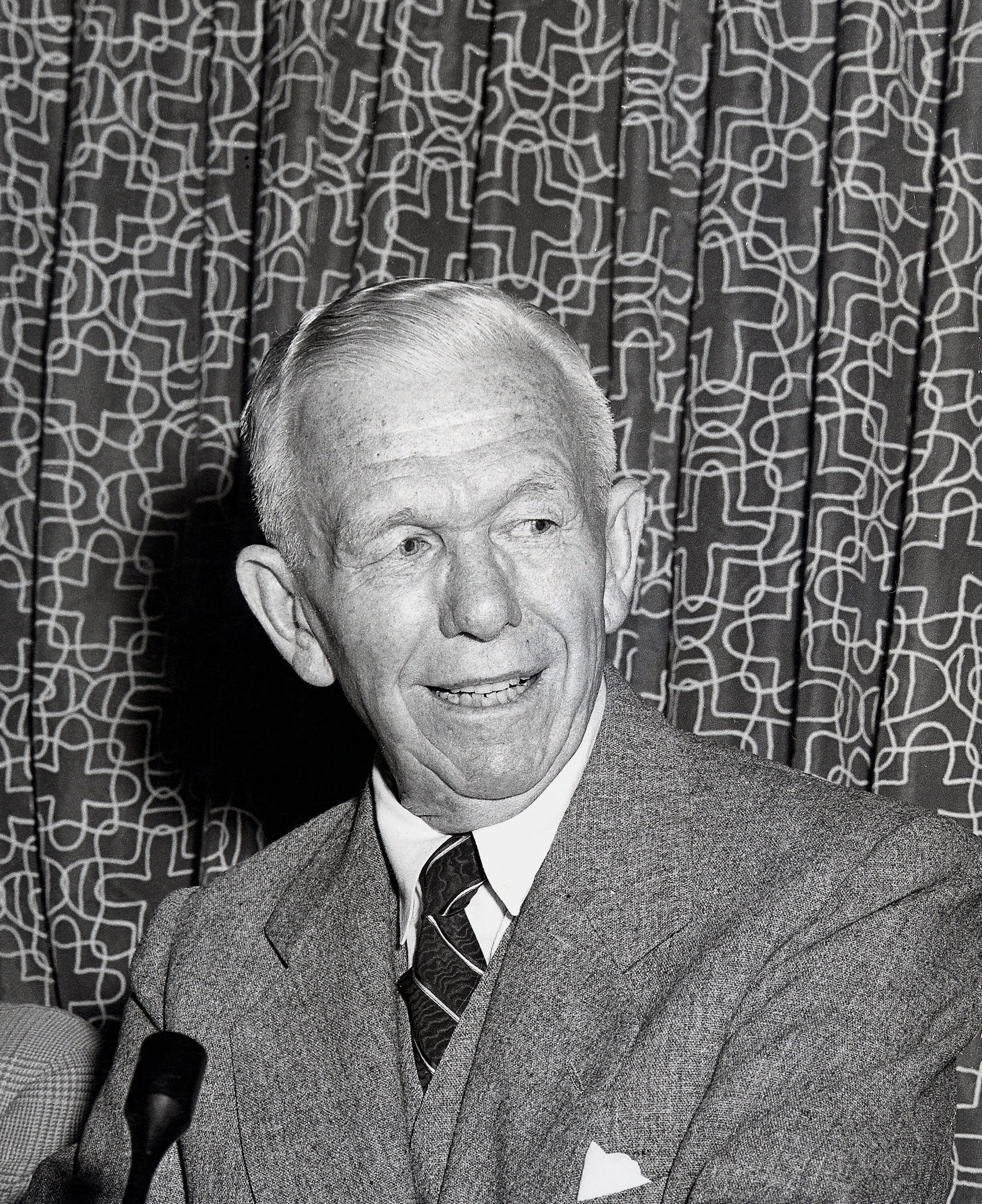
The Nobel Peace Prize
The Episode
Welcome to our final episode of “Now & Then at Dodona Manor.” Think for a moment about medals that American soldiers might be given. The Silver Star, Distinguished Service Medal, maybe even the Medal of Honor. What about the Nobel Peace Prize? No? That could be because only one professional soldier has ever been awarded the Nobel Peace Prize: George Marshall.
Marshall on the deck of the Andrea Doria
Questions for Thought and Discussion
On October 30, 1953, two years after Marshall had retired as secretary of defense, the Nobel Prize Committee announced that he would be given its Prize for Peace on December 10. Marshall immediately received numerous letters of congratulations, and President Dwight Eisenhower was one of the first to do so. Eisenhower admitted that he found it difficult to understand why some people were picked for awards, but “this time I thoroughly approve.” Secretary of State Dean Acheson sent his congratulations: “All of us in your former command…are proud and happy. The award was right and proper and just. I hope that it has brought you and Mrs. Marshall some of the joy it has brought us.” Former President Harry Truman expressed his excitement about the award in an interview with Edward R. Murrow that Marshall later watched. Queen Frederika of Greece added her congratulations when she visited Marshall and his wife while they were in Walter Reed Hospital suffering from the flu.
Marshall during the press conference held on the Andrea Doria
Marshall’s doctors hoped that he’d travel by ship to Norway to avoid bad weather and recover in some sunlight on deck. On November 28, 1953, Marshall arrived at Pier 84 in New York City. Looming over him was the Andrea Doria, the pride of Italy, which he would take to Naples, Italy. Marshall was met by the New York press after they learned that he would be on his way to Norway to accept the prize for his sponsorship of the European Recovery Program. In a room set aside aboard the ship for a televised press conference, Marshall told reporters that he was highly honored to accept the award as a “tribute to the whole American people.” A great many individuals contributed to its success, he said, and if anyone should be singled out, it should be the late Senator Arthur Vandenburg. Marshall thought his health would improve and that he would have time on board to write his speech, but that was not to be true.
The rainy weather and his lingering sickness made it impossible for Marshall to work outside on the deck and he arrived in Naples without a single line written. He journeyed on to Paris, where he dictated his speech to a stenographer in Paris in just over an hour. He enlisted Colonel Andrew Goodpaster for more help. Goodpaster sat on the floor of Marshall’s hotel bedroom and compiled the dictated sections to form a solid speech.
The day before the ceremony, Marshall flew from Paris to Oslo, Norway. On December 10, he received the Nobel Peace Prize in the city hall with King Haakon VII of Norway in attendance. C.J. Hambro, a member of the Nobel Peace Prize Committee, spoke at length of Marshall’s record as a soldier and of his postwar achievements. He paid special tribute to his efforts to reconstruct Europe and rehabilitate the economies of countries through the European Recovery Program. He emphasized that this first Nobel Peace Prize to go to a professional soldier was not given for military deeds but rather for his work in the cause of peace. However, Marshall’s career as a soldier made his selection controversial.
Marshall receiving the Nobel Peace Prize
When Marshall walked up to the podium, three protesters in the balcony rushed forward and began dropping handbills that accused Marshall of military crimes, all while screaming, “Murderer! Murderer!” Marshall simply looked up calmly. Members of his air crew were sitting near the demonstrators and quickly pulled them back from the balcony before handing them off to the police. The king and his family jumped to their feet, followed by the entire audience, to give the general a thunderous ovation.
The following evening, Marshall began his acceptance speech with an honest acknowledgement that he “lacked the magic and artistry” of Winston Churchill, who had been awarded the Nobel Prize for literature the day before in Stockholm, Sweden. Marshall was candid about the controversy surrounding his selection and faced it head-on: “There has been considerable comment over the awarding of the Nobel Peace Prize to a soldier. I am afraid this does not seem as remarkable to me as it quite evidently appears to others.…The cost of war in human lives is constantly spread before me, written neatly in many ledgers whose columns are gravestones. I and greatly moved to find some means or method of avoiding another calamity of war.” To maintain peace, he declared, a “very strong military posture is vitally necessary today.” Marshall went beyond speaking of military strength as a guarantor of peace and listed several factors essential to achieving peace: good faith among nations and men, improvements in education, and the spread of democracy. Even when Marshall was receiving one of the most recognized awards in the world, he was humble and saw a broader picture. He recognized the need for peace and among all nations to prevent future wars.
Marshall was never particularly proud of his speech – saying that it was jumbled together hastily by a recovering sick man with some last-minute help – but considering the circumstances of its construction, it had the force of sharp, personal conviction. It is possibly one of his most famous speeches, second only to his speech at Harvard about the European Recovery Program.
When Marshall returned home in late December, he drove back to Dodona Manor and rested after his long journey, no doubt spending time in his quiet library. It was in this room and on this table that Marshall displayed his Nobel Prize for many years. This is a replica of the Nobel Peace Prize. The original is housed at the George C. Marshall Museum in Lexington, Virginia. The original medals were designed by Gustav Vigeland and were made of 23-carat gold. On the front is the image of Alfred Nobel with his name and the years of his birth and death. The other side of the medal represents a group of three men forming a fraternal bond. The inscription around the edge reads: “Pro pace et fraternitate gentium,” meaning “For the peace and brotherhood of men.” On General Marshall’s medal, his name and the relevant year is engraved on the edge.
The Nobel Peace Prize was but one of the countless accolades that Marshall received during and after his 50 years of continuous service to the world. Marshall never expected, nor even wanted awards like the Nobel Peace Prize. He simply served at the will of the people and fought for world peace through his characteristic trustworthiness and patriotism. Leaders today can emulate these principles to fight for a better world and secure a peaceful world for our children.
Thank you for joining us in this episode of “Now & Then” at Dodona Manor.



